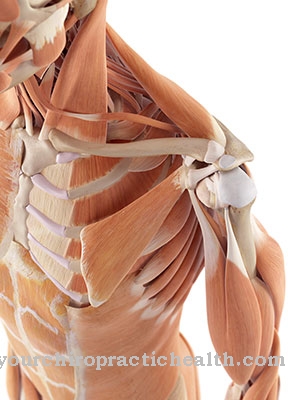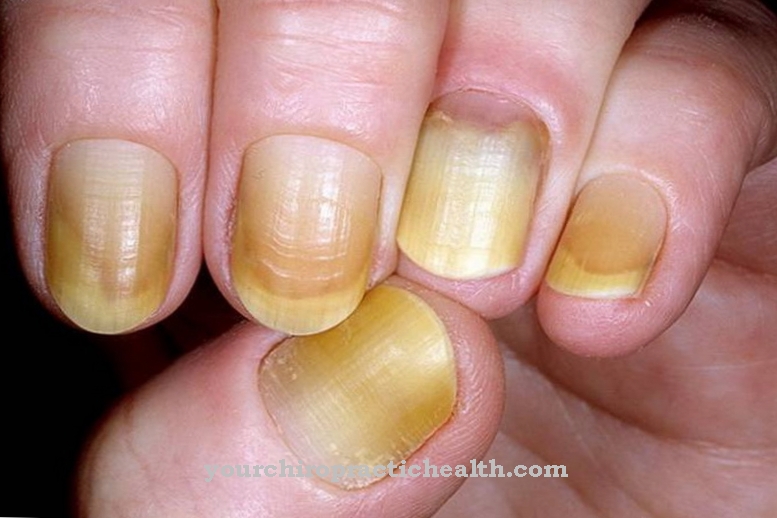As the name itself suggests, it is Dental phobia the Fear of the dentist. Just the idea of the drill or its noises can cause mild panic attacks in many people. In order to prevent long-term damage to the oral cavity, psychotherapy should be started in good time if you are afraid of the dentist.
What is dental phobia?
.jpg)
Dental phobia is fear of the dentist. The development is usually psychological. For decades, however, even doctors did not see dental phobia as the serious problem it is recognized as today.
Because fear prevents on average every second German citizen from visiting the dentist regularly. The dental phobia can not only lead to unsightly teeth. Instead, all diseases of the teeth, gums or jaw are treated too late or even never because of the dental phobia.
This can lead to further problems of the immune system as well as the organs, which are additionally promoted by the dental phobia.
causes
The causes of dental phobia or fear of the dentist are usually complex. In general, any experience that is perceived as unpleasant at the dentist or with your own teeth can trigger the dental phobia. As a rule, the reasons for this are to be sought in childhood, when visits to the dentist are not only something completely new, but also show the child a vulnerability to strangers that he has not known before.
Dental phobia, on the other hand, very rarely develops in old age, but is then mostly based on actually unpleasant experiences. Such treatments can be long-lasting and painful. In some cases, operations are also the reason for the dental phobia. However, the fear does not always have to have something to do with the dentist.
According to more recent findings, completely atypical causes can trigger dental phobia. Rape and other situations of coercion, for example, can cause psychological reactions that later result in dental phobia. In case of doubt, psychological help should always be considered when assessing the dental phobia.
You can find your medication here
➔ Toothache medicationSymptoms, ailments & signs
With dental phobia, those affected suffer from a great fear of going to the dentist. As a rule, this fear leads to relatively infrequent visits to a dentist, so that the health of the affected person's teeth is significantly affected. This often leads to tooth decay, holes in the teeth or even broken teeth.
In many cases, those affected do not visit the dentist even if there is severe pain or inflammation. The root of the tooth can also be damaged, so that it has to be completely removed.The dental phobia thus has a very negative effect on the state of health in the mouth of the person concerned.
Much damage can no longer be made reversible. If the person concerned visits a dentist with a dental phobia, heart palpitations and very profuse sweating occur. Tension or even tremors can also occur.
This means that proper work is not possible for the dentist either, as the person concerned suffers from such severe anxiety states. In addition to the pain caused by the dental phobia, there can also be an unpleasant halitosis, which has a very negative effect on the patient's quality of life.
course
The course of the disease of dental phobia is just as diverse as its causes. Usually the person concerned feels weak and anxious just thinking about the dentist. The dental phobia often triggers tremors in the body and sweating. Palpitations and inner tension are also symptoms of dental phobia.
In the further course, visits to the dentist are avoided. Existing appointments are not kept or are always postponed. Dental phobia often leads to patients not having their teeth examined and treated for years or even decades. Even significant pain and unbearable bad breath are mostly accepted approvingly by those affected by dental phobia.
When should you go to the doctor?
In the case of dental phobia, those affected are often unable to visit a dentist or oral surgeon for years. Visiting the dentist is disproportionately fearful in the case of a dental phobia. It is usually only done when there is severe pain.
Many dentists now specialize in sometimes extreme fears in their patients. Through conversations, hypnosis, acupuncture treatments or light anesthesia, they help those affected to make a visit to the dentist a bearable and everyday routine. Careful preparation of the patient for dental treatment takes a certain amount of time.
A patient with a pronounced dental phobia can face their problem by visiting a psychotherapist or a hypnotist. The former is about identifying the cause and overcoming the fears. Often, however, the complaints are already so severe that psychotherapeutic support is provided directly in the dental practice. For this purpose, an interdisciplinary collaboration between dentists and other medical professionals is ideal.
Hypnosis and acupuncture treatments can also prepare a patient with a dental phobia for a dental visit. However, those affected must be receptive to it. It is important to take away the fear of pain from the anxious patient. The doctor explains each step of the treatment to those affected. It requires a certain amount of empathy on the part of the treating dentist to cope with the situation.
Doctors & therapists in your area
Treatment & Therapy
How the dental phobia is to be treated always depends on the individual case. In milder cases, normal conversation therapies or exchanges with other sufferers can eliminate the dental phobia. But especially in those patients in whom the dental phobia has remained untreated for several years, only special psychological or even psychiatric procedures can usually provide relief.
It can take a few months before the therapist even gets to the causes of the dental phobia. Breathing techniques and relaxation exercises for the muscles are recommended to help overcome dental phobia. It is therefore crucial for those affected by dental phobia to even take the first step towards healing.
Because it actually has a double effect: If the dental phobia can be eliminated, it is not only the psychological fear that is alleviated. It also opens the way for the patient to have their teeth examined and treated. A physical effect is therefore also achieved in the therapy of dental phobia.
Outlook & forecast
Dental phobia does not usually get better without professional help. A distinction must be made between an unpleasant but normal reluctance to visit the dentist and a manifest dental phobia. The longer the pathological fear of the dentist remains untreated, the longer the treatment of the dental phobia itself will usually take.
It takes place in cooperation with a psychologist and a dentist who should specialize in anxiety patients. However, the effect of the dental phobia on dental health is also relevant for the prognosis. With meticulous oral and dental hygiene, some patients with fear of dentists manage to avoid worse illnesses.
However, after years and decades it is mostly noticeable that you have not seen a dentist for the preventive check-ups. Dental diseases are usually only presented to the dentist when the affected patient is already experiencing significant problems and of course pain.
Dental phobia is therefore often associated with problematic dental health. In this sense too, it should be treated in good time so that the patient can immediately visit the dentist if problems arise. The longer dental problems are postponed, the more they can get worse and even affect other areas of the body like heart muscle health in the long run.
You can find your medication here
➔ Toothache medicationAftercare
With dental phobia, patient preparation is just as important as aftercare. Anyone who is terrified of the dentist must first be prepared for a visit to the dentist with confidence-building measures. Follow-up care includes the confidential conversation that the dentist has after the treatment. He also has to consider the result of his work and review it with the patient. The bite has to be right, the further treatment needs to be discussed in peace. The whole thing should happen in a relaxed, casual atmosphere.
In the conversation that he has as part of the follow-up care, the doctor can find out how the treatment was perceived by the patient. A special way of addressing patients with dental phobia is required. Often the patients have not gone to the dentist for a long time because of their panic.
Extensive renovation work is necessary. The dentist wants the aftercare to ensure that the patient comes to the next appointment. Among other things, he should learn that there can also be visits to the dentist during which neither drilling nor dentures are fitted using anesthetics.
You can do that yourself
Those suffering from dental phobia should seek psychological help to solve the problem at its root. In addition to professional treatment, there are also numerous self-help tips for everyday life so that the fear and panic before a visit to the dentist can be reduced and the quality of life of those affected can increase.
Before treatment by the dentist, the person affected should speak openly about their fears. In the course of a conversation between the attending physician and the patient, the patient should receive precise information about the treatment process so that he can prepare for the procedure and at the same time build trust in the dentist.
The fear of unknown and unpredictable processes can thus be alleviated. If the patient realizes that he can ask for an interruption of the treatment at any time, the feeling of being exposed can be minimized and the feeling of loss of self-control can be minimized.
When the anxiety response starts with a release of adrenaline in the body, it is advisable to practice relaxation techniques. The relaxation exercises help to direct your thoughts away from the uncomfortable situation and to be able to control and calm your breathing better. General anesthesia can reduce the fear of the upcoming procedure and prevent traumatic experiences for the patient during the procedure.

.jpg)



.jpg)
.jpg)

















.jpg)



